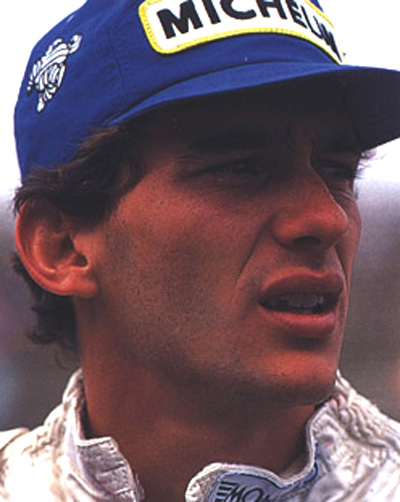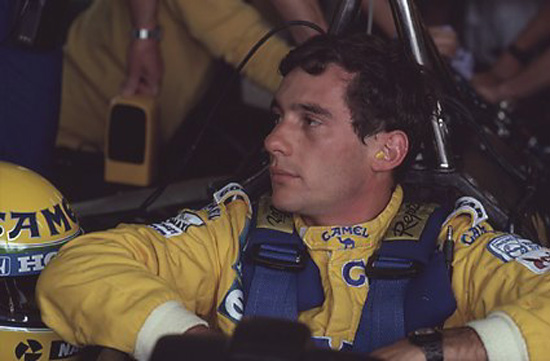I
WANT IT ALL
|
So much to do in one life time (people do you hear me) Not a man for compromise and whereís and whyís
and living lies So Iím living it all Yes Iím living it all And Iím giving it all, and Iím giving it all It ainít much Iím asking, if you want the truth Hereís to the future, hear the cry of youth I want it all, I want it all, I want it all and I want it now
|
Lyrics
by: Queen
1984.
When
he joined F-1, he chose to join the Toleman team although he was offered better
"seats". He signed until 1986. A man would ask himself: why did he
choose a losing team when all he wanted were victories? Because he knew that
every winning team already has a no.1 driver who would be given all the
attention and he would only be in the no.1 driverís shadow. That was not what
he wanted. He wanted to be as independent and free as possible to be able to
learn undisturbedly and immediately try to use what he learnt without
limitations because in his opinion that was the only way one could truly go
forward. He explained it later in these words:
"My only
motivation is to be successful. If I was just driving along with everybody else,
then I couldnít justify my job as a racing driver to myself."
What
that meant was that he didnít want only to protect somebodyís back, but to
drive for his own account even in a non-competitive car. And in this particular
car, with the assistance of rain, he drove the famous race in
That
year Senna won 13 points for Toleman which was about to go bankrupt and said
goodbye to them. Of course, it couldnít have developed without problems and
much dust raising because he was still under contract. But money was of help
here - Senna simply bought himself off. He outgrew Toleman faster than he
expected and it was time for him to go on, to go forwards. People didnít
understand correctly Ayrtonís aspiration always to go forwards. Whole series
of words had been used to describe this feature of his personality: for them it
was arrogance, intolerance, obsession, incapability to see the things from other
peopleís point of view and so on. Thereís one episode from that period,
which was written and talked about, that could be used as an illustration.
Namely, it is that Ayrton was the only one who didnít manage to find time to
visit his wounded teammate Johnny Cecotto then. It was explained that he was too
busy getting successful and couldnít be bothered with human feelings. Was it
really so?
Ayrton
himself said the following about it (when they reminded him again years later
that Johnny still hadnít forgiven him):
"Yes, I can understand that from his point of view... It was a mistake on my part. I was terribly preoccupied after the crash, but I suppose I just didnít think it would have made such a difference to Johnny if I had gone to see him... Sorry, but one doesnít get everything right."

Then,
at the time, nobody was bothered too much but when a young Toleman driver became
SENNA, it suddenly became extremely important. Why didnít Ayrton go to see his
colleague? Be assured that he informed himself well about his teammateís
condition. At the same time he took upon himself all the obligations concerning
racing in the team. And a visit as a mere formality (according to which people
are wrongly judged), wasnít in keeping with Ayrton. He didnít need
formalities, pretences and embellishments; simplicity was his way, as it is with
all truly great people. And when help was necessary and he was able to help he
would always do so.
Mark
Blundell had once tried to give us his vision of the "other side" of
Ayrton, as he called it. Mark realized that Ayrton had left him to find his own
transport to the airport (when he didnít allow Joseph Leberer, his fitness
coach, to give him a ride), because it was Ayrtonís revenge for being faster
than him on testing. To even think such a thing is ridiculous. If it hadnít
been for any other alternative and the help had been necessary, Ayrton himself
would have sat in the car and taken him to the airport. Ayrton always helped but
the situation had to be such that people couldnít solve the problems
themselves because he himself would never ask other people for anything as long
as he was able to do it by himself. He expected the others to behave in a
similar way. And Mark was mistaken again if he had perhaps expected some special
sort of amiability out of gratitude for a well-done job. For Ayrton it was
understandable by itself that a job should be always done to the best of oneís
ability. There was no other way for him, and therefore no need for any special
gratitude. That was the real reason Mark was indirectly sent a message to find
his own transport and it wasnít some small Sennaís revenge, as it seemed to
him.
1985-1987 ESTORIL
UNDER RAIN
The
next three years Senna drove for Lotus and won six races. Those were the last
victories for Lotus. One of those victories, Ayrton Senna`s first ever F-1
victory, is remembered even today because of his, later so many times written
about, "superhuman" abilities to drive under rain. And Senna himself
loved this race very much because, except of the first victory, he also won his
first pole here. It was the race in Estoril, on
Senna's first victory - Estoril 1985
One
of the reasons is that he had been practicing a lot in wet conditions. When he
realized at a very early age that driving under rain requires special
concentration and skill, he decided to master this skill. Wet track was a
challenge, because it is an aggravating circumstance for drivers, and he loved
challenges. The other reason was that water was
his element. He felt good when it rained, he would get a new impulse for
work, and rain suited his nerves. When all this is taken into account, we begin
to understand the strength of the "RAIN MAN" and why he was able to
drive in "wet races" with so much more superiority than other drivers.
Otherwise
it was the time Sennaís whole personality was turned to racing. F-1 became his
world, he was giving it everything and he said about it:
"Racing is everything for me, it is the challenge of my life, it is a profession and a vocation, a hobby and at the same time a virus that has no cure. I have lost interest in everything else, my soul and my body belong to racing."
Monte Carlo 1987
And
winning the title was a priority to him then: "I hope very much that Iíll be the world champion one day,
because winning the title is the only reason Iím racing", he said.
Those
were still his learning years as a professional, as well as a person. There was
so much more he needed to learn. He was unremittingly assessing his competitors,
asking himself why theyíre doing this or that and when he would "enter
their minds", he tried to do everything better and faster. It canít be
said that they were thrilled with him because he believed he had the right to
take everything he could that he earned by exerting himself. Someone would
naturally have to lose and it would be the one who put less effort in it. That
was the reason why Ayrton had been using also the smallest opportunity which
brought no matter how small, even microscopic improvement. At the same time he
was working on himself, he needed to learn how to deal with the media and the
public, because his natural, impulsive, inborn honest presentation and language
werenít something the world respects or accepts in good faith. It made him
angry.
"I know
myself - I am generally very direct. Because Iím like that some people think
Iím puffed up and arrogant. Sometimes that bothers me a bit, because Iím
sure Iím not."
And almost everybody thought that; the English in F-1 were collectively leading a war against him. They were assaulting him verbally and even physically. For Mansell and his gang Senna was a red scarf... But he was improving and improving despite everything. He said: "I would like to push myself to the limit in everything I do."

Imola 1987
That
was a special quality which couldnít have passed unnoticed. They created a
nickname "MAGIC" for him, although no nickname could stay attached to
him permanently. The name AYRTON SENNA had more magic about it than any other
nickname but maybe we could still single out one, and that is "The Great
Brazilian", which suited him best. Lotusís chief engineer Ducarouge, for
example, said the following about him then: "Iíve never experienced such
a driver, a driver who can give me such information about his car. He has
sensors all over. Working with him is a dream for every engineer." Despite
it they still werenít able to give him the only thing he was lacking to become
world champion in 1987 - a good racing car. Ayrton was great but Lotusís car
not any more, therefore it was inevitable for him to move to a new racing team
the following year.